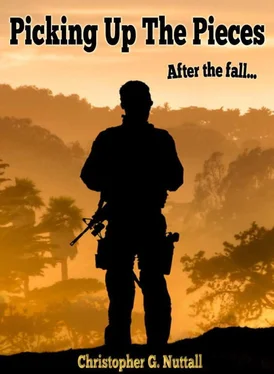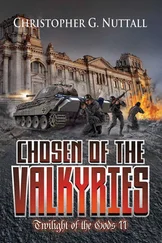“Thank you,” I said. I’d taken the time to skim through some of the local newspapers and hadn’t recognised myself in them. It read as if I’d taken the fort single-handedly without even a single soldier to back me up… and that the occupation was a decisive blow and the war would end tomorrow. They were both lies. “We need to talk.”
Something in my voice caught her attention. “We need to talk?” She repeated. “What do we need to talk about?”
“The war,” I said, flatly. I looked at her and was surprised to see how tired and worn down she was. She was being hectored by everyone who wanted a position or influence. “We need a political solution to the war or we will lose it.”
She stared at me in shocked silence. “We can’t lose the war,” she protested. “How can we improve the planet if we lose the war?”
“You won’t have to worry about that,” I said, dryly. “If the farmers win, they’ll be condemning you and most of your government to death.”
Frida ground her teeth. “Explain,” she said, finally. “Why can’t we win the war? We outnumber the money-grabbing bastards!”
“We don’t,” I said. “Counting recruits, police and militia, we have around ten thousand men who can reasonably be considered fighting troops. That includes, by the way, the Legion and recruits who have had just a week’s training. We have a small base of a thousand men who handle everything from supply and logistics to what little paperwork we have, but they’re not fighters. The vast majority of the people in the cities are not trained to fight and we don’t have the facilities to train them up to fight. If we used them as soldiers now, the result would be a massacre and probably atrocities on both sides.
“The farmers and miners have, between them, around three million men and women who have some shooting skills, all the equipment they could use and are spread out over a vast area,” I continued. I wasn’t going to mention the possibility of off-world help, not to her. Frida didn’t need to know that. “We don’t have the manpower to hold them all down without burning then out of their farms, which would be… counterproductive as you need the farms to produce food. Your census agents have been wiped out and I cannot provide enough protection to guarantee their safety. We can win any conventional battle unless they bring in some of the equipment they took from the UN — like tanks and armoured cars — but they don’t have to win themselves. They just have to not lose.
“They think you’re exploiting them for your own benefit — for the benefit of the cities — and they’re right. They can’t feed the expanded population anyway without expanding massively, which they don’t feel like doing because they think you’re going to legally steal the crops anyway. From their point of view, half the city population dying off in the next year isn’t actually a bad outcome. The remainder might feel more inclined to respect the farmers and their point of view.”
“That’s horrible,” Frida said, genuinely shocked. “We’re trying to make the world a better place.”
“But you’re trying to do it by force,” I said, as gently as I could. “I know you think you’re doing the right thing — and on the face of it, you are — but it’s simply unsustainable over the long run. When it collapses, as it will, you’ll have a nightmarish time rebuilding anything from the ruins of your planet, just as the UN is having problems rebuilding Earth. It might not actually matter. You and I will probably be dead by then.”
“But…”
I drove over her objections. “You have these elaborate schemes to fix the problems faced by the poor,” I said. “You’re giving them free education, free housing,, free healthcare, free welfare grants, free children’s benefits, free… well, free everything. Where is the money for them all coming from?”
Frida looked at me. “From taxes,” she said, surprised. “We do have a working tax base.”
“Not any longer,” I said. “You see, the programs you want are expensive and I did the math.” Actually, it was Muna who’d done the math, but I decided not to bring her into it. There was no point in exposing anyone else. “You can’t afford to pay for them. You’ll run out of money very quickly.”
“Then we’ll raise taxes,” Frida said, sharply. “Why shouldn’t the rich pay to help the poor?”
“Because you don’t have very many rich people,” I countered. “You will start raising taxes directly and indirectly, either though honest taxes or regulations with infinitive fines on them. This will push the cost of operating a business through the roof and businesses will start to close rather than pay you taxes for nothing. This, in turn, will put thousands more unemployed people onto the streets, increasing the burden on your welfare payments at a time when you want it sharply reduced. The fall in working businesses will mean less tax revenue and a spending crisis.
“All of this will be matched by a parasite bureaucracy, which will rapidly become corrupt and oppressive, and a parasite state of people who will vote for you in exchange for government largess. The costs of running the state will skyrocket at the exact same time your income is falling sharply. If you try to discard elements of the parasites, you will discover that their votes slip to your political opponents, some of whom won’t hesitate to take advantage of the situation and dispose you, taking power for themselves.
“At some point, probably within two years at the most, you will discover that your system has rotted away from the inside and that your aim of building a better society will have been replaced by trying desperately to stay on top, knowing that falling from such heights would destroy you utterly. You will, in short, have entered the same failure curve as the UN back on Earth, with two major exceptions. You will be unable to export your revolution because there is a powerful neutral force — Fleet — willing and able to prevent it. You will also be threatened by increasingly desperate resistance from the farmers and miners who might well succeed in toppling your government and imposing their own order on the chaos. By then, extremists will have come to power and they may commit genocide to obliterate the people they will blame for their misfortunes.”
I allowed anger to slip into my voice. “It’s happened before and it will happen again,” I concluded. “You can use the emergency powers you’ve granted yourself to prevent it from happening to your world, or you can continue this futile attempt to reshape your world and be crushed when it all falls apart.”
Frida stared at me. She probably couldn’t have been more surprised if I’d hauled off and slapped her right in the face. Like most people of her kind, she thought of soldiers as being robots, or endlessly obedient, and didn’t realise that we could think for ourselves. Of course we could; we analysed battles of the past to prepare, as best as we could, for the future. I’d studied politics ever since I’d realised that I’d picked up hundreds of political enemies. I knew what was going to happen… unless we sought to avert it.
“Very well,” she said, finally. I knew better than to take that to mean that she’d given in completely. “What do we do about it?”
“First, we start getting people out to the fields and preparing new farms,” I said. “We can probably use some of the Legionnaires who come from a farming background to help newcomers start work on the farms. We won’t aim for anything too ambitious, but there are thousands of kilometres of unclaimed land out there. We can develop it and force people out onto the land. That would not only boost the food supply, but keep people out of welfare.”
Читать дальше












